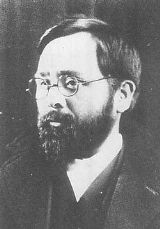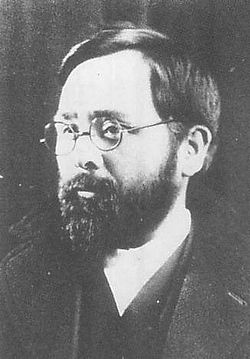
Jiichiro Matsumoto
Encyclopedia

was a famous Japanese politician and businessman with origins from Fukuoka Prefecture
Fukuoka Prefecture
is a prefecture of Japan located on Kyūshū Island. The capital is the city of Fukuoka.- History :Fukuoka Prefecture includes the former provinces of Chikugo, Chikuzen, and Buzen....
. He was undoubtedly leader of burakumin
Burakumin
are a Japanese social minority group. The burakumin are one of the main minority groups in Japan, along with the Ainu of Hokkaidō, the Ryukyuans of Okinawa and Japanese residents of Korean and Chinese descent....
liberation movement from the early beginning of it and was called "buraku liberation father" in Buraku Liberation League
Buraku Liberation League
is one of the burakumin's rights groups in Japan.-Pre-WW2 period:The origin of the Buraku Liberation League is the , founded in 1922. However, in 1942, some of the leading activists, including Asada Zennosuke , were recruited into the military...
.
Career
Matsumoto was born in Chikushi DistrictChikushi District, Fukuoka
is a district located in Fukuoka, Japan.As of 2003, the district has an estimated population of 46,540 and a density of 620.62 persons per square kilometer. The total area is 74.99 km².-Towns and villages:*Nakagawa...
, Fukuoka Prefecture, which is part of the modern city of Fukuoka
Fukuoka
Fukuoka most often refers to the capital city of Fukuoka Prefecture.It can also refer to:-Locations:* Fukuoka, Gifu, a town in Gifu Prefecture, Japan* Fukuoka, Toyama, a town in Toyama Prefecture, Japan...
. His parents were burakumin. In 1900, after graduating Sumiyoshi elementary school, Kasuya junior high school, and Kanjō junior high school under the prewar system in Tokyo, he dropped out of Dalian
Dalian
Dalian is a major city and seaport in the south of Liaoning province, Northeast China. It faces Shandong to the south, the Yellow Sea to the east and the Bohai Sea to the west and south. Holding sub-provincial administrative status, Dalian is the southernmost city of Northeast China and China's...
High school.
In 1907 he was earning for living as a street fortune-teller and quack doctor. In 1910 he was sent back home by the enforcement of consul general.
In 1911 he established the Matsumoto Company, which engaged in civil engineering and heavy construction. The company was immediately destroyed by the toughest members of the Kyūshū Yakuza
Yakuza
, also known as , are members of traditional organized crime syndicates in Japan. The Japanese police, and media by request of the police, call them bōryokudan , literally "violence group", while the yakuza call themselves "ninkyō dantai" , "chivalrous organizations". The yakuza are notoriously...
Clan.
In 1921, the Chikuzenkyō Revolutionary Group was organized.
The same year, during the celebration of the 300th anniversary of the first Fukuoka daimyo
Daimyo
is a generic term referring to the powerful territorial lords in pre-modern Japan who ruled most of the country from their vast, hereditary land holdings...
Kuroda Nagamasa
Kuroda Nagamasa
was a daimyo of Japan. He was the son of Kuroda Kanbei.In 1577, When Nagamasa was a small child, his father was condemned as a spy by Oda Nobunaga. Nagamasa was kidnapped and nearly killed as a hostage. Takenaka Hanbei ended up rescuing him....
, the protest movement, organized by Matsumoto, was raised up, and celebration turned into "voluntary donation from non-discriminated descendants against forms of discrimination" under enforcement.
In 1923, Matsumoto became chairman of .
In 1925, he assumed the office of as chairman of committee.
Having strong ideas of equality between people across the country, Matsumoto organized the strife of not giving the title of nobility to Iesato Tokugawa. Later, after case of mysterious assassination of Iesato Tokugawa, Matsumoto was foung guilty in attempted assassination and imprisoned for 4 months in 1927. Yet, people who were at the background of this case, were burned to ashes at the Tokugawa residence later.
In 1926, Matsumoto lead an impeachment strife against the Fukuoka Regiment Discrimination. In 1929, he was imprisoned without clear reasons for the second time, for 3 years 6 months.
In 1936, he became a member of the House of Representatives (was elected for the third time).
In 1942 he was elected by recommendation to . This was a governmental camouflage, because Ichirō Hatoyama
Ichiro Hatoyama
was a Japanese politician and the 52nd, 53rd and 54th Prime Minister of Japan, serving terms from December 10, 1954 through March 19, 1955, from then to November 22, 1955, and from then through December 23, 1956.-Personal life:...
in fact didn't write any recommendations, but this election was a good excuse for banishment Matsumoto's public offices.
In 1946 he became a chairman of , and from 1947 - the member of Parliament. The same year he was elected as vice-chairman of the House of Councilors. He was known among the people as a leftist leader. Yet, he is well-known for saying about himself "I became a chairman despite of burakumin origins. Socialists hold the majority in the House of Representatives and in the House of Concilors, and in order to Komakichi Matsuoka to win, they've chosen me."
In 1948, being a vice-chairman of the House of Councilors, he made a refusal to the Emperor's audience in the case known as "The Sideways Scuttle of a Crab". After that his public offices were banished, and banishement was cancelled in 1951.
In 1953 Matsumoto became a chairman of .
Till his death in 1966, Matsumoto continued buraku liberation activities.
"Quack doctor" question
During his stay in Dalien, Matsumoto worked as a quack doctor under the title of "first class army surgeon of Great Japan". In the book Matsumoto Jiichirō's Biography the following was written: "abandoned by modern medical care were welcomed", and there are recordings that "If Matsumoto was critical about aggression of Japanese imperialists against China, he wouldn't had proclaimed himself as 'first class army surgeon of Great Japan'"; and some criticism of his activities: "He earned for living getting cash from 'treatment' of Chinese people. Mistaken 'treatment' quite frequently took one's life. Matsumoto did this fraud and swindling in China, but he never did it in Japan". Although Matsumoto said in the next years: "I cannot do percussion and auscultation, but even now I have great self-confidence in visual examination".War collaboration question
In 1942 when Matsumoto's candidacy was elected to Taisei Yokusankai according to the recommendation, campaign bulletin had the following greetings: "Stream of blood for the Country!", "Overthrow America in the fight till death, destroy the Anglo-Saxons domination the world; in unity of hundreds in one nation, and young and aged, united with gunfire, despite of hardship, leading to completion of invincible victory!"On June 14, 1943, Matsumoto was one of organizers of imperialistic members group called "Eight Days Committee", Seigō Nakano and Satoshi Akao were both present at the inaugural meeting when "encouragement speech" took a place. The creeds of "Eight Days Committee" were used at the early beginning of the Pacific War: "Let our every action show the real meaning of the national polity!", "Let's fight remembering our Emperor has a faith we will win!" etc. Though Matsumoto did everything supporting was activities, including budget agreements, after the defeat he suddenly shifted to other side and rejected militarism: "I've been always fighting for equality, revealing antiwar movements creeds I always knew about the defeat", "I have always had antiwar ideals", "I am for anti-militarism and democracy".
On January 1953, in Yangon, Burma, at the welcoming citizens mass meeting, Matsumoto performed a speech as a representative of Social Democratic Party (leftist). Then he said "Japan is not only rapidly economic developing country, but on the other hand, thanks to imperial fascism, we sacrificed many countries to that was, which came to us like Devil. Of cource, our socialists were against this war, ..." — saying this Matsumoto probably lied about his war collaboration.
Citations
- "Neither violence nor target"
- "Where aristocrats there treaties"
- "No drinking. No smoking. No wife, no buying girls. No necktie." (These principles Matsumoto maintained all his life)
- "Fighting with authority, what do I think about? If the Emperor hadn't conferred a decoration on me, my strife probably wouldn't have existed. Being decoration, brandish the authority. This thought exists till buraku discrimination exists."
- "My enemy is not you. My enemy is one standing behind your back. But if you feel yourself soul-searching what you have done, I forgive you."
Further reading
- 松本治一郎「部落解放への三十年」(近代思想社)1948年
- 部落解放同盟Buraku Liberation Leagueis one of the burakumin's rights groups in Japan.-Pre-WW2 period:The origin of the Buraku Liberation League is the , founded in 1922. However, in 1942, some of the leading activists, including Asada Zennosuke , were recruited into the military...
中央本部編「松本治一郎伝」(解放出版社)1987年 - 金静美「水平運動史研究―民族差別批判」(現代企画室)1994年
- 福岡県人権研究所・松本治一郎プロジェクト編「松本治一郎」(西日本新聞社)2003年
- 高山文彦 (作家)|高山文彦「水平記 松本治一郎と部落解放運動の一〇〇年」(新潮社)2005年
- 水平同志会編「伝記松本治一郎」(水平同志会)2006年

